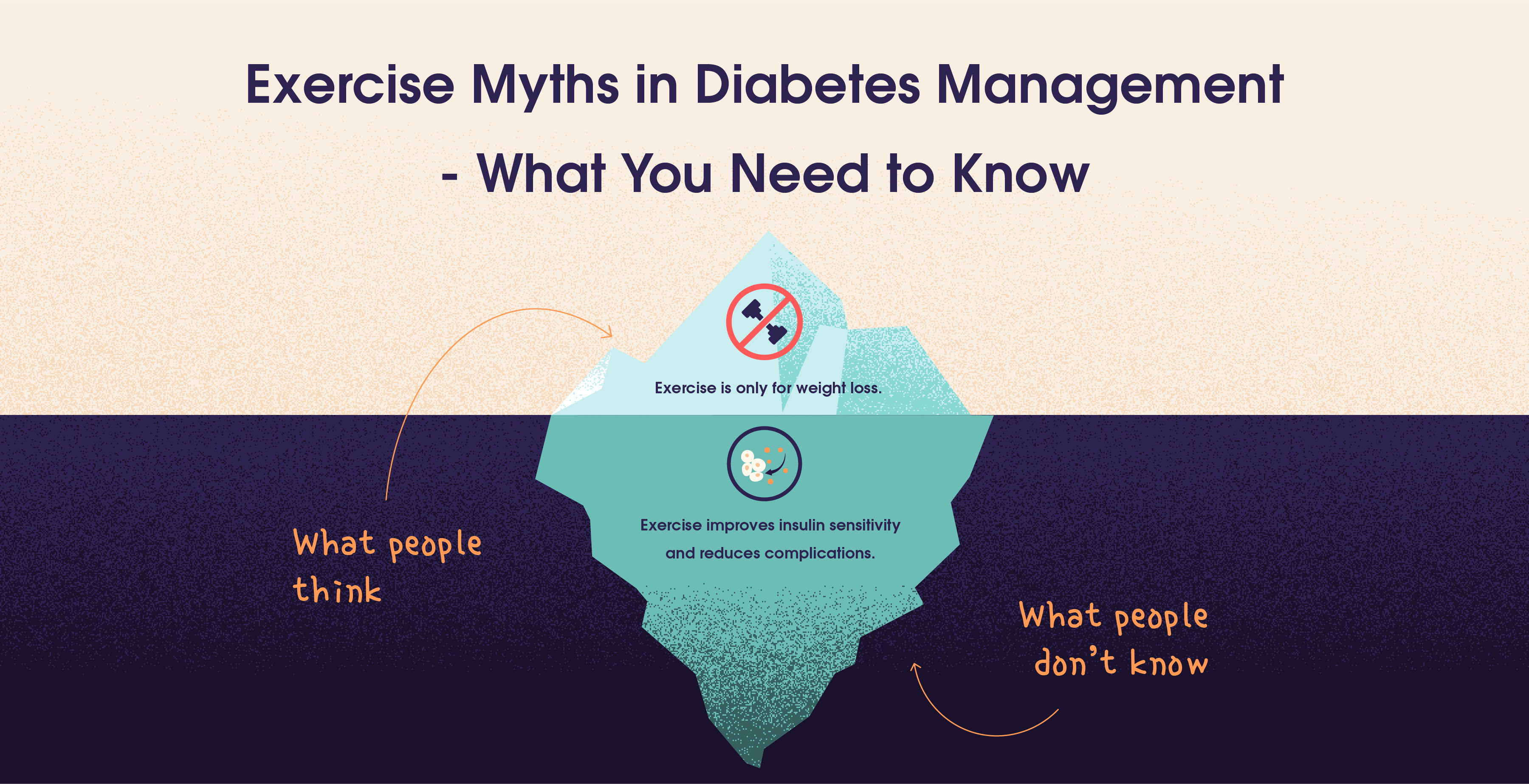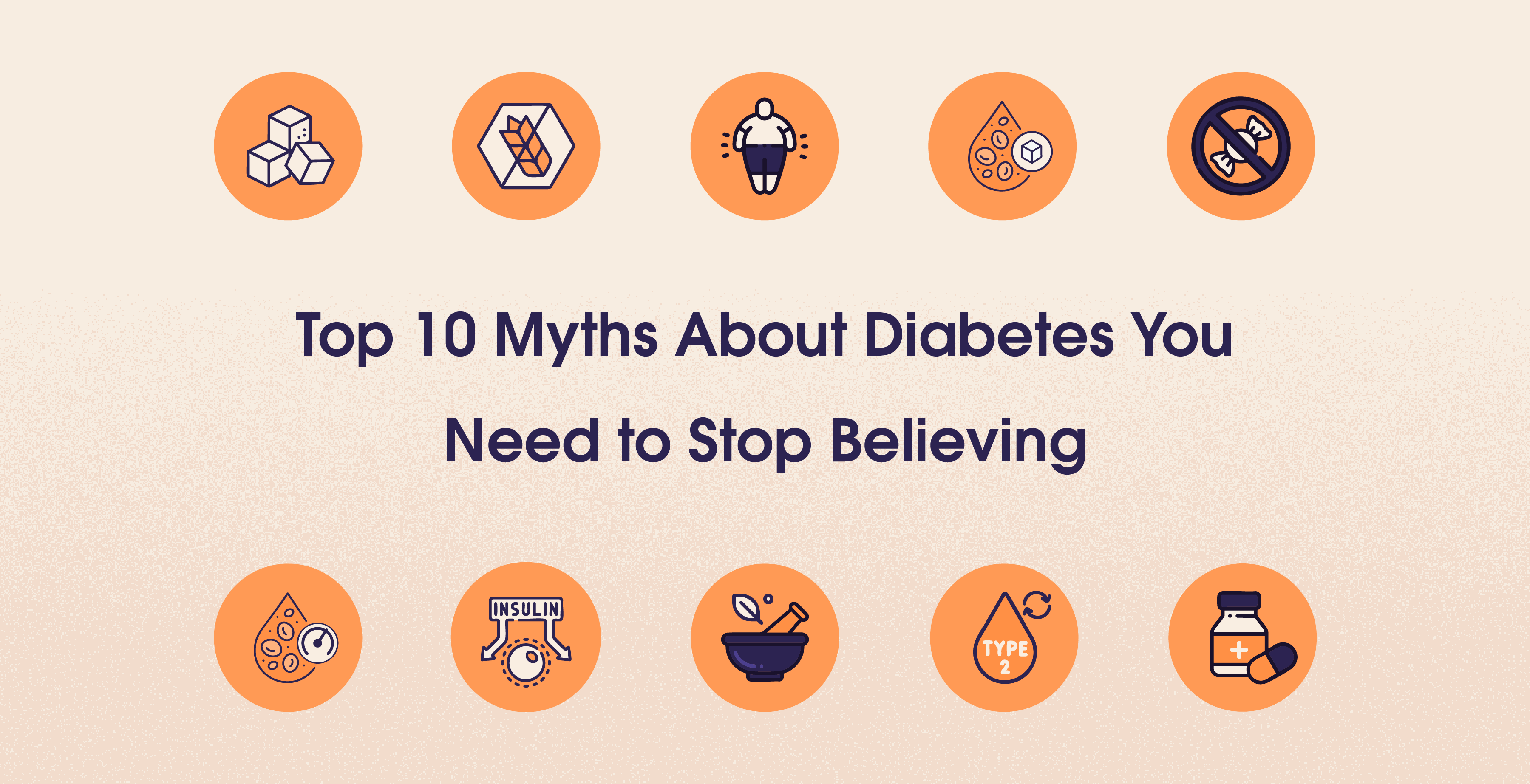Debunking Diabetes Myths
Apr 3, 2024
Ashima Raizada



Table Of Contents
Navigating through the sea of information on prediabetes and diabetes, it's easy to encounter myths and misconceptions. Unraveling the truth from fiction can be challenging, and we completely empathize if you've been misled by some of these myths at one point or another. It's a learning curve we've all been through, aiming to separate the wheat from the chaff when it comes to understanding this prevalent health issue.
Highlights
Consuming sugar alone doesn't directly cause diabetes; obesity from a high-sugar diet is a significant risk factor.
Diabetes is a serious condition that can lead to severe complications, including cardiovascular disease and blindness.
Diabetes affects individuals of any weight, debunking the myth that it's a condition solely for those who are overweight.
Being obese doesn't guarantee you'll develop diabetes, indicating other factors contribute to its onset.
People with diabetes can enjoy sweets in moderation, emphasizing a balanced and mindful approach to their diet.
Myths
Sugar Causes Diabetes
It's a common misconception that consuming sugar directly causes diabetes. While indulging in sugar-heavy diets can lead to weight gain and obesity - a known risk factor for type 2 diabetes - it's not the sole culprit. Research has specifically linked regular soda intake to an increased risk of developing type 2 diabetes, regardless of body mass index (BMI) and overall caloric consumption. This association doesn't hold the same weight as other sugary or artificially sweetened beverages. When it comes to type 1 diabetes, dietary habits are not considered a risk factor, highlighting the complexity and multifaceted causes of diabetes.
Diabetes Isn't Serious
This myth downplays the seriousness of prediabetes and diabetes, treating them as a minor inconvenience rather than a significant health concern. This perception is dangerously misleading. Unmanaged prediabetes leads to diabetes which can lead to a host of severe complications, including but not limited to cardiovascular diseases, kidney damage, and blindness. In the United States, diabetes was the direct cause of over 84,000 deaths in 2018 alone. Such statistics underscore the critical nature of diligent diabetes management and the need for individuals to understand and respect the potential severity of this condition.
Only Overweight People Get Diabetes
The belief that diabetes exclusively affects overweight individuals is a widespread misconception. While it's true that obesity is a significant risk factor for developing type 2 and gestational diabetes, individuals of any weight can be diagnosed with diabetes. Surprisingly, 11% of those with type 2 diabetes are neither overweight or obese, challenging the stereotype. Furthermore, type 1 diabetes shows no correlation with body weight, debunking the myth that diabetes is a condition solely affecting those who are overweight.
If You're Obese, You'll Get Diabetes
Obesity is indeed a significant risk factor for diabetes; however, it's not a definitive predictor. In the U.S., approximately 39.8% of adults are classified as obese, but only 13% of the entire population has diabetes. These statistics illustrate that while obesity increases the risk, it does not guarantee the development of diabetes, indicating other factors at play in the disease's onset.
Diabetics Can't Eat Sugar
The notion that individuals with diabetes must steer clear of sugar entirely is a misconception. Managing carbohydrate intake is essential for people with diabetes, but it doesn't mean they must forgo sweets altogether. The American Diabetes Association suggests that sweets can be included in a diabetic's diet in moderation, especially if saved for special occasions and balanced within a nutritious and comprehensive eating plan. This approach debunks the idea that diabetes necessitates completely avoiding sugar, advocating for a balanced and mindful approach to diet.
Diabetes Always Leads to Blindness and Amputation
The fear that diabetes inevitably results in blindness and amputation is unfounded. While diabetes can lead to these severe complications if poorly managed, they are not guaranteed outcomes for every individual with diabetes. Effective management of diabetes can significantly reduce the risk of such dire consequences. It emphasizes the importance of proper care, monitoring, and treatment to prevent the worst-case scenarios associated with this condition.
Diabetics Shouldn't Drive
Diabetes does not automatically disqualify someone from driving. The American Diabetes Association states that most individuals with diabetes are capable of driving safely, provided their condition is well-managed and doesn't impair their driving abilities. It's a matter of ensuring that the diabetes is under control, without episodes that could jeopardize driving safety, rather than an outright prohibition against driving for all diabetic individuals.
Prediabetes Always Turns into Diabetes
The progression from prediabetes to type 2 diabetes is not a foregone conclusion. Lifestyle interventions, such as increasing physical activity and making dietary adjustments, can effectively reverse prediabetes and halt the progression to type 2 diabetes. This reality offers hope and underscores the importance of early detection and lifestyle modifications to combat the onset of diabetes.
People with Diabetes Can't Be Active
Contrary to the myth that diabetes restricts physical activity, exercise is a cornerstone of diabetes management. Engaging in regular physical activity improves insulin sensitivity, reduces blood pressure, and aids in weight management, all of which are beneficial for individuals with diabetes. It's crucial, however, for people with diabetes to monitor their blood sugar levels during exercise and consult with their healthcare provider to adjust their treatment plan to ensure safe and effective physical activity.
Once You Have Diabetes, Your Health Will Only Get Worse
The notion that a diabetes diagnosis means an inevitable decline in health is misleading. Many people with diabetes, particularly type 2, can significantly improve their health and even achieve remission through diligent lifestyle changes. Adopting a healthy diet, engaging in regular physical activity, reaching a healthy weight, and effectively managing stress can all control blood sugar levels to the extent that medication may become unnecessary. However, continuous monitoring is crucial to prevent a relapse, highlighting the importance of a personalized and proactive approach to diabetes management.
Diabetics Must Avoid Fruit
The idea that fruit is off-limits for individuals with diabetes due to its sugar content is a misconception. Fruits are a vital part of a nutritious diet, offering essential nutrients and fiber, and their benefits often outweigh the potential drawbacks of their natural sugar content. Instead of eliminating fruit, individuals with diabetes are advised to assess their overall diet and reduce their intake of higher-sugar foods where necessary, ensuring they do not miss out on the health benefits fruits provide.
Diabetic People Can't Eat Carbs
Believing that diabetes necessitates cutting out carbohydrates entirely is incorrect. Carbohydrates are an essential part of a balanced diet, providing the body with needed energy. The focus should instead be on selecting high-quality, complex carbohydrates that are digested slowly, helping to maintain stable blood sugar levels. Moderation and the quality of carbohydrates consumed are key, particularly for those with prediabetes, allowing for a balanced diet without the need to eliminate this crucial nutrient group.
You Have to Lose a Lot of Weight If You're Diabetic
The belief that significant weight loss is required for individuals with prediabetes or diabetes is not entirely accurate. While managing weight is important in preventing the progression of type 2 diabetes, drastic weight loss is not always necessary. Small, sustainable changes to diet and an increase in physical activity can make a significant impact. Research has shown that even modest weight loss, such as 5% to 7% of body weight, can dramatically reduce the risk of developing type 2 diabetes. The emphasis should be on gradual, healthy lifestyle changes rather than quick, drastic weight reduction.
Medication is the Only Way to Manage Diabetes
While medication is a critical component for many in managing diabetes, it is not the sole strategy. Lifestyle modifications, including healthy eating and regular physical activity, play a crucial role in controlling blood sugar levels. A diet rich in fruits, vegetables, lean protein, and reduced processed food intake, coupled with physical activities that build muscle and reduce belly fat, can significantly influence blood sugar management. The Centers for Disease Control and Prevention (CDC) recommends at least 150 minutes of moderate exercise each week, complemented by strength training, underscoring the importance of a holistic approach to diabetes management beyond medication.
Prediabetes and Diabetes Only Affect Older People
Age is indeed a factor in the risk of developing prediabetes, especially for individuals over 45. However, it is not solely a concern for the older population. Various factors increase the risk of prediabetes, including being overweight, having a family history of diabetes, leading a sedentary lifestyle, experiencing gestational diabetes, or having conditions like polycystic ovary syndrome (PCOS). Recognizing these risk factors and adopting lifestyle changes early can help manage or reverse prediabetes, highlighting the importance of being informed and proactive about one's health at any age.
Conclusion
Debunking the myths surrounding prediabetes and diabetes is an important part of managing and potentially reversing the condition. Despite the misconceptions, diabetes doesn't solely hinge on weight, nor does it fully restrict lifestyle choices. Proper management through diet, exercise, and regular monitoring means living well with diabetes is entirely achievable. Importantly, prediabetes can be reversed with lifestyle adjustments, underscoring the power of informed actions over fear-driven myths. Clearing up these myths empowers everyone with the truth, leading to healthier lives and better outcomes for those facing diabetes.
References
Navigating through the sea of information on prediabetes and diabetes, it's easy to encounter myths and misconceptions. Unraveling the truth from fiction can be challenging, and we completely empathize if you've been misled by some of these myths at one point or another. It's a learning curve we've all been through, aiming to separate the wheat from the chaff when it comes to understanding this prevalent health issue.
Highlights
Consuming sugar alone doesn't directly cause diabetes; obesity from a high-sugar diet is a significant risk factor.
Diabetes is a serious condition that can lead to severe complications, including cardiovascular disease and blindness.
Diabetes affects individuals of any weight, debunking the myth that it's a condition solely for those who are overweight.
Being obese doesn't guarantee you'll develop diabetes, indicating other factors contribute to its onset.
People with diabetes can enjoy sweets in moderation, emphasizing a balanced and mindful approach to their diet.
Myths
Sugar Causes Diabetes
It's a common misconception that consuming sugar directly causes diabetes. While indulging in sugar-heavy diets can lead to weight gain and obesity - a known risk factor for type 2 diabetes - it's not the sole culprit. Research has specifically linked regular soda intake to an increased risk of developing type 2 diabetes, regardless of body mass index (BMI) and overall caloric consumption. This association doesn't hold the same weight as other sugary or artificially sweetened beverages. When it comes to type 1 diabetes, dietary habits are not considered a risk factor, highlighting the complexity and multifaceted causes of diabetes.
Diabetes Isn't Serious
This myth downplays the seriousness of prediabetes and diabetes, treating them as a minor inconvenience rather than a significant health concern. This perception is dangerously misleading. Unmanaged prediabetes leads to diabetes which can lead to a host of severe complications, including but not limited to cardiovascular diseases, kidney damage, and blindness. In the United States, diabetes was the direct cause of over 84,000 deaths in 2018 alone. Such statistics underscore the critical nature of diligent diabetes management and the need for individuals to understand and respect the potential severity of this condition.
Only Overweight People Get Diabetes
The belief that diabetes exclusively affects overweight individuals is a widespread misconception. While it's true that obesity is a significant risk factor for developing type 2 and gestational diabetes, individuals of any weight can be diagnosed with diabetes. Surprisingly, 11% of those with type 2 diabetes are neither overweight or obese, challenging the stereotype. Furthermore, type 1 diabetes shows no correlation with body weight, debunking the myth that diabetes is a condition solely affecting those who are overweight.
If You're Obese, You'll Get Diabetes
Obesity is indeed a significant risk factor for diabetes; however, it's not a definitive predictor. In the U.S., approximately 39.8% of adults are classified as obese, but only 13% of the entire population has diabetes. These statistics illustrate that while obesity increases the risk, it does not guarantee the development of diabetes, indicating other factors at play in the disease's onset.
Diabetics Can't Eat Sugar
The notion that individuals with diabetes must steer clear of sugar entirely is a misconception. Managing carbohydrate intake is essential for people with diabetes, but it doesn't mean they must forgo sweets altogether. The American Diabetes Association suggests that sweets can be included in a diabetic's diet in moderation, especially if saved for special occasions and balanced within a nutritious and comprehensive eating plan. This approach debunks the idea that diabetes necessitates completely avoiding sugar, advocating for a balanced and mindful approach to diet.
Diabetes Always Leads to Blindness and Amputation
The fear that diabetes inevitably results in blindness and amputation is unfounded. While diabetes can lead to these severe complications if poorly managed, they are not guaranteed outcomes for every individual with diabetes. Effective management of diabetes can significantly reduce the risk of such dire consequences. It emphasizes the importance of proper care, monitoring, and treatment to prevent the worst-case scenarios associated with this condition.
Diabetics Shouldn't Drive
Diabetes does not automatically disqualify someone from driving. The American Diabetes Association states that most individuals with diabetes are capable of driving safely, provided their condition is well-managed and doesn't impair their driving abilities. It's a matter of ensuring that the diabetes is under control, without episodes that could jeopardize driving safety, rather than an outright prohibition against driving for all diabetic individuals.
Prediabetes Always Turns into Diabetes
The progression from prediabetes to type 2 diabetes is not a foregone conclusion. Lifestyle interventions, such as increasing physical activity and making dietary adjustments, can effectively reverse prediabetes and halt the progression to type 2 diabetes. This reality offers hope and underscores the importance of early detection and lifestyle modifications to combat the onset of diabetes.
People with Diabetes Can't Be Active
Contrary to the myth that diabetes restricts physical activity, exercise is a cornerstone of diabetes management. Engaging in regular physical activity improves insulin sensitivity, reduces blood pressure, and aids in weight management, all of which are beneficial for individuals with diabetes. It's crucial, however, for people with diabetes to monitor their blood sugar levels during exercise and consult with their healthcare provider to adjust their treatment plan to ensure safe and effective physical activity.
Once You Have Diabetes, Your Health Will Only Get Worse
The notion that a diabetes diagnosis means an inevitable decline in health is misleading. Many people with diabetes, particularly type 2, can significantly improve their health and even achieve remission through diligent lifestyle changes. Adopting a healthy diet, engaging in regular physical activity, reaching a healthy weight, and effectively managing stress can all control blood sugar levels to the extent that medication may become unnecessary. However, continuous monitoring is crucial to prevent a relapse, highlighting the importance of a personalized and proactive approach to diabetes management.
Diabetics Must Avoid Fruit
The idea that fruit is off-limits for individuals with diabetes due to its sugar content is a misconception. Fruits are a vital part of a nutritious diet, offering essential nutrients and fiber, and their benefits often outweigh the potential drawbacks of their natural sugar content. Instead of eliminating fruit, individuals with diabetes are advised to assess their overall diet and reduce their intake of higher-sugar foods where necessary, ensuring they do not miss out on the health benefits fruits provide.
Diabetic People Can't Eat Carbs
Believing that diabetes necessitates cutting out carbohydrates entirely is incorrect. Carbohydrates are an essential part of a balanced diet, providing the body with needed energy. The focus should instead be on selecting high-quality, complex carbohydrates that are digested slowly, helping to maintain stable blood sugar levels. Moderation and the quality of carbohydrates consumed are key, particularly for those with prediabetes, allowing for a balanced diet without the need to eliminate this crucial nutrient group.
You Have to Lose a Lot of Weight If You're Diabetic
The belief that significant weight loss is required for individuals with prediabetes or diabetes is not entirely accurate. While managing weight is important in preventing the progression of type 2 diabetes, drastic weight loss is not always necessary. Small, sustainable changes to diet and an increase in physical activity can make a significant impact. Research has shown that even modest weight loss, such as 5% to 7% of body weight, can dramatically reduce the risk of developing type 2 diabetes. The emphasis should be on gradual, healthy lifestyle changes rather than quick, drastic weight reduction.
Medication is the Only Way to Manage Diabetes
While medication is a critical component for many in managing diabetes, it is not the sole strategy. Lifestyle modifications, including healthy eating and regular physical activity, play a crucial role in controlling blood sugar levels. A diet rich in fruits, vegetables, lean protein, and reduced processed food intake, coupled with physical activities that build muscle and reduce belly fat, can significantly influence blood sugar management. The Centers for Disease Control and Prevention (CDC) recommends at least 150 minutes of moderate exercise each week, complemented by strength training, underscoring the importance of a holistic approach to diabetes management beyond medication.
Prediabetes and Diabetes Only Affect Older People
Age is indeed a factor in the risk of developing prediabetes, especially for individuals over 45. However, it is not solely a concern for the older population. Various factors increase the risk of prediabetes, including being overweight, having a family history of diabetes, leading a sedentary lifestyle, experiencing gestational diabetes, or having conditions like polycystic ovary syndrome (PCOS). Recognizing these risk factors and adopting lifestyle changes early can help manage or reverse prediabetes, highlighting the importance of being informed and proactive about one's health at any age.
Conclusion
Debunking the myths surrounding prediabetes and diabetes is an important part of managing and potentially reversing the condition. Despite the misconceptions, diabetes doesn't solely hinge on weight, nor does it fully restrict lifestyle choices. Proper management through diet, exercise, and regular monitoring means living well with diabetes is entirely achievable. Importantly, prediabetes can be reversed with lifestyle adjustments, underscoring the power of informed actions over fear-driven myths. Clearing up these myths empowers everyone with the truth, leading to healthier lives and better outcomes for those facing diabetes.
References
Table Of Contents
Table Of Contents
Table Of Contents
Read More


Apr 2, 2025
Sayfali Rawlani


Feb 17, 2025
Aparna Hurtis


Feb 10, 2025
Aparna Hurtis



Company
Copyright © 2025 trst health. All right reserved.

